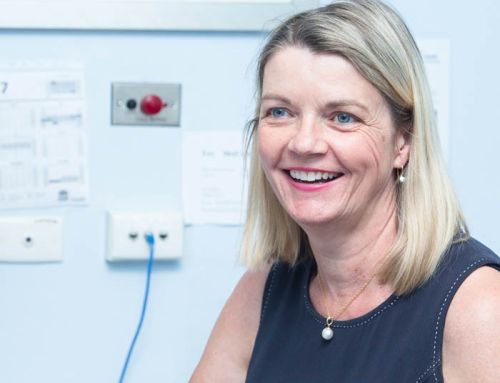PORTEC-3 was a randomised phase III study that had a significant impact on the world of gynaecological cancer research.
The study was led by LUMC GCIG/Dutch Gynaecological Oncology Group (DGOG), with ANZGOG leading in Australia and New Zealand in collaboration with the NHMRC Clinical Trials Centre, the University of Sydney.
Australia and New Zealand Study Chair Professor Linda Mileshkin said, “ANZGOG was an important contributor to PORTEC-3. The trial took a while to gain momentum internationally. In the end, Australia and New Zealand were the third highest recruiters to the trial, with strong recruitment in both countries. We benefitted from very strong collaborations between medical oncology, gynae-oncology and radiation oncology – there was a lot of enthusiasm.”
The trial aimed to assess the effectiveness of postoperative radiation combined with chemotherapy compared to radiation therapy alone in women at high risk of relapse after surgery for endometrial cancer. This trial involved a total of 686 women, with 122 participants from Australia and New Zealand, and was conducted at 103 sites across the globe. Dr Pearly Khaw, ANZGOG member and Radiation Oncologist, and the Trans-Tasman Radiation Oncology Group (TROG) undertook the quality assurance in radiotherapy assessment for all centres that participated in PORTEC-3.
The focus and significance of PORTEC-3
The primary objective of PORTEC-3 was to determine whether the addition of chemotherapy during and after radiation therapy could further improve the chances of survival and reduce the risk of tumour recurrence in both the pelvic area and distant sites. The aim was to evaluate the safety, efficacy, and impact on the quality of life of this combined treatment approach.
Initial results from PORTEC-3 did not show a significant failure-free survival benefit. However, an updated analysis conducted after an additional year of follow-up revealed a significant improvement in overall survival for women with high-risk endometrial cancer who received adjuvant chemoradiotherapy compared to those who received radiotherapy alone. This result changed the standard of care for women with high-risk endometrial cancer who are now routinely offered treatment with adjuvant chemotherapy. The detailed quality of life analysis in the trial was also helpful to understand the impact of the additional treatment on women, so that they can make an informed decision about whether to have this therapy.
 “It took a long time to see the survival benefit in PORTEC-3. This has been an important lesson – trials take time – especially practice changing trials. It’s important for us to be aware of and plan for that. It has also been fantastic to collaborate with other endometrial cancer researchers around the world as part of the TransPORTEC initiative. This group has worked on analysing tumour specimens from women enrolled into the trial, which has provided many novel insights and publications about the biology of endometrial cancer, and the groups most likely to benefit from additional chemotherapy” said Professor Linda Mileshkin, Principal Investigator
“It took a long time to see the survival benefit in PORTEC-3. This has been an important lesson – trials take time – especially practice changing trials. It’s important for us to be aware of and plan for that. It has also been fantastic to collaborate with other endometrial cancer researchers around the world as part of the TransPORTEC initiative. This group has worked on analysing tumour specimens from women enrolled into the trial, which has provided many novel insights and publications about the biology of endometrial cancer, and the groups most likely to benefit from additional chemotherapy” said Professor Linda Mileshkin, Principal Investigator
The significance of the PORTEC-3 trial lies in its contribution to the management of high-risk endometrial cancer. Traditionally, the focus of treatment for endometrial cancer has been primarily with surgery. However, as the incidence of this cancer continues to rise, it’s clear that not all women are cured by surgery alone. Trials like PORTEC-3 offer additional options for managing this disease. (Further reading: TransPORTEC )
The importance of PORTEC-3
Moreover, PORTEC-3 has highlighted the value of international and national collaboration in conducting successful clinical trials. Lessons learned from this trial emphasise the importance of radiation oncology quality assurance, with pre-trial benchmarking identifying and addressing quality issues before the trial started. Such measures ensure accurate and reliable trial results.
In conclusion, PORTEC-3 has paved the way for transformative advancements in the treatment of high-risk endometrial cancer and has established the efficacy of adjuvant chemotherapy in improving overall survival for women diagnosed with endometrial cancer.










